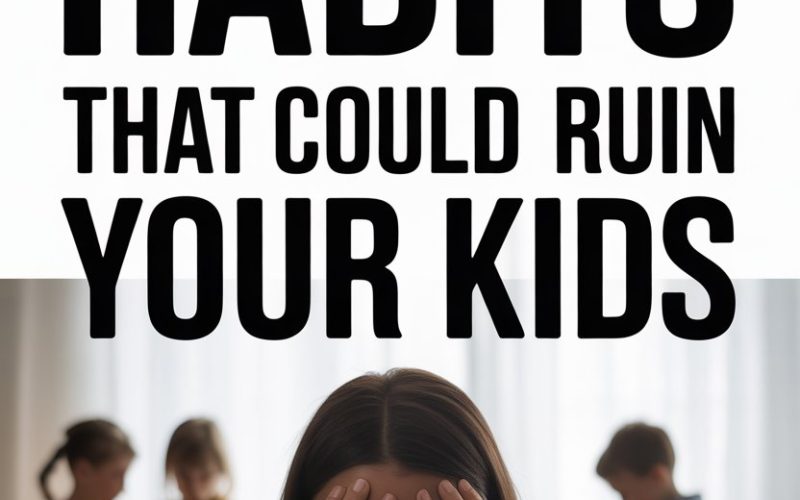Every parent wants to raise good humans. Not perfect ones—those don’t exist unless you’ve met your neighbour’s Instagram feed.
But it’s easy to trip into a few well-meaning routines that, over time, can turn your darling into something less than delightful.
Let’s gently shine a light on five sneaky parenting habits that could steer your kids off course.
1. Overpraising Everything
Gold star for waking up! Trophy for eating that one slice of carrot! Sound familiar?
We all want our kids to feel good about themselves, but if every scribble is treated like the Mona Lisa, children start expecting applause for simply existing.
A classic study from Carol Dweck at Stanford showed that too much praise—especially for intelligence rather than effort—can actually make kids less likely to take on challenges. They begin to fear failure, thinking it means they’re no longer “special.”
Instead, save the standing ovation for genuine effort or progress. When your little Picasso scribbles another “masterpiece,” try, “You really stuck with that drawing even when it got tricky.
What part did you like best?” Instead of inflating their self-esteem like a parade balloon, you’re helping it grow strong and steady.
2. Rescuing at Every Turn
The urge to shield your child from all discomfort is as primal as making sure they’ve got clean socks. But swooping in like a caped crusader every time they struggle means they never get to flex their problem-solving muscles.
Picture it: your child forgets their lunch at home. The clock is ticking—do you dash to school to save the day? It’s a tempting move.
Yet, psychologist Jessica Lahey, author of The Gift of Failure, argues that stepping back (and letting them face the mild misery of a forgotten sandwich) teaches resilience, resourcefulness, and responsibility.
Tonight, the next time your child faces a setback—didn’t make the team, got a low mark, or lost a toy—pause before rushing to fix it. Try asking, “What do you think you could do next time?”
It might be uncomfortable at first (for you, mostly), but those moments are the birthplace of grit.
3. Never Saying No
It’s 10 p.m. and they’re angling for another biscuit, or binging telly way past bedtime. A little negotiation is fine, but when “no” disappears from your vocabulary, children start thinking their wishes are commands.
Research published in Child Development highlights that inconsistent boundaries can lead to kids who struggle with self-control and respect for others. Not exactly a recipe for a harmonious household—or classroom.
It’s tough to be the bad cop, especially after a draining day. But children need the security of gentle limits.
Set clear expectations and stick to them, even if it brings on the world’s smallest protest march. It teaches them patience, respect, and the crucial skill of handling disappointment without falling to pieces.
4. Comparing to Others
“Why can’t you be more like your brother?” is the anthem of sibling rivalry everywhere. Comparing your child to their mates, siblings, or the kid from playgroup who already speaks fluent Mandarin does nothing but chip away at their confidence.
Psychologist Susan Newman points to research showing that constant comparison can breed resentment, anxiety, and low self-esteem. Each child is a unique recipe—sometimes you just get more spice than sugar.
Celebrate your child’s quirks (even if it means you’re forever stepping on Lego and learning about dinosaurs at 6 a.m.). Try swapping, “Look how tidy your cousin keeps her room,” for, “I love the way you arranged your books. It’s very you.”
That way, you’re building them up rather than nudging them to fit someone else’s mould.
5. Always Putting Kids First
This one’s controversial, so brace yourself.
Modern parenting often means your needs are at the bottom of the pile—somewhere beneath the dirty socks and half-eaten rice cakes. But martyrdom doesn’t raise happy kids; it raises kids who think the world orbits around them.
Dr. Jennifer Hartstein, a child psychologist, notes in her interview with CBS, that children benefit from seeing parents as whole people with boundaries, needs, and passions of their own.
It models self-respect and teaches them to respect others’ time and space.
Tonight, set aside ten minutes for yourself—read, have a cuppa, or call a friend. Tell your child, “This is Mum’s time now, I’ll be with you in a few minutes.”
They might protest, but you’re teaching them the invaluable skill of waiting—and showing them everyone deserves care, including you.
Raising Good Humans: The Long Game
Raising kids is a marathon in mismatched socks.
Perfection isn’t the goal (thank goodness), but catching yourself in these habits can make all the difference between raising a considerate, resilient human and, well, a future contestant on a reality show.
Try tweaking just one habit this week. Grit, boundaries, and a bit of self-care don’t just benefit your child—they make family life a smidge less chaotic.
And who doesn’t want that?




